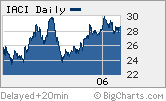|
Diller takes on Google
Barry Diller, CEO of IAC/InterActive, thinks the new Ask.com can compete in search against Google, Yahoo! and MSN.
NEW YORK (CNNMoney.com) – Barry Diller knows he has a tough fight on his hands. But the former media mogul turned Internet empire builder hopes that he can outdo Google, Yahoo! and MSN in the ultra-competitive world of online search. Diller, whose IAC/InterActive owns Ask.com, the search engine formerly known as Ask Jeeves, said at a conference in New York Monday that there is room for a fourth major search engine. "I'm convinced that we will gain people who want to use Ask.com as a first or second choice in search," he said at the Search Engine Strategies conference. "What we've concentrated on is everyday search. The experience isn't as satisfying as it can be." Ask.com was formally re-launched on Monday. The company said ta-ta to Jeeves, the jovial butler character from the PG Wodehouse novels who was the search engine's mascot since the company was founded in 1996. IAC bought Ask Jeeves last year for about $1.9 billion. Diller said Monday that it was time for Jeeves to be retired since he felt that many consumers still thought of the search engine as being the niche site where you go and type in a question and then get a series of links as opposed to being a serious threat to other search firms. "The search engine needed to drop the baggage. The Jeeves character was a nice, human, emotional touch and that's not bad," Diller said. "But it connoted something that I didn't think allowed Ask.com to play in the center world of search." Diller and Ask.com's U.S. general manager Jim Lanzone showcased some of the site's new features that they felt can make Ask.com more popular, including a new encyclopedia search function, maps that allow users to see a visual test drive of their itinerary as well as get walking directions from one place to another and a Web-based desktop search tool. Wall Street seemed to like the news. Shares of IAC/InterActive (Research), which is among the cheaper large-cap Internet stocks, rose nearly 4.5 percent Monday morning. Searching for more traffic
But some analysts have questioned whether or not IAC, which also owns Web sites such as Match.com, LendingTree and eVite, will be able to capture a significant portion of the online search business. According to the most recent data from online traffic research firm Nielsen//NetRatings, Ask.com had just a little more than 2 percent share of online searches in the U.S. The search business has been booming for the past few years as many advertisers have found that paying for ads tied to specific keyword searches is an effective way to reach consumers. Google (Research) has been the biggest beneficiary of this trend and it has become so popular almost entirely by word-of-mouth, a fact not lost on Diller. "Google hasn't spent a nickel on marketing," Diller said. "Google sneezes and it's on the front page of every paper in the world." But Diller said he didn't think that Google or Yahoo! (Research) are invulnerable to competition. "I don't think market share belongs to just one company. We're actually ready to compete." He chided Google in particular for its "Don't Be Evil" mantra, calling it "pretentious." "The truth is to a lot of people, Google is now a real business and they do a lot of things that people won't like," Diller said. Despite saying that, Diller did defend some recent controversial moves by Google. Google and other search engines have been criticized for cooperating with the Chinese government and agreeing to censor certain search results on their Chinese Web sites. Ask.com does not have a Chinese search engine up and running yet but Diller did not find fault with the actions of Google and other search colleagues. "If you're going to function in another country, you have to obey that country's rules," he said. Diller also lauded Google's decision to refuse to submit random search results to the U.S. government as part of the government's case to revive an online child pornography law. Diller said if the government made similar demands of Ask.com, he would do the same thing as Google. "If you have people's information, we have an absolute obligation to protect it," he said. "You have to be a guardian of the information. If you don't, you'll lose your customers." And that very challenge -- trying not to lose customers while simultaneously gaining new ones -- is crucial for Ask.com's success. Diller stressed, however, that taking on the established search giants will be both costly and time-consuming. Diller said he did not expect Ask.com to generate significant earnings for IAC for some time and that customer habits would not change overnight. "We have to be patient. You can't think that you'll do an ad campaign and get an instant reaction," he said. "Legacy is a tough thing to overcome." For a look at why Google is on the defensive, click here.
Does Yahoo! have the biggest China problem? Click here. |
|





